- Home
- V. E. Schwab
A Conjuring of Light Page 4
A Conjuring of Light Read online
Page 4
She managed a small, exhausted smile. “You’re welcome.”
He helped her to her feet and retrieved his coat, which sat crumpled on the table where Holland—Osaron—had dropped it.
Again Lila scanned the room. “What happened, Kell? Who did this to you?”
“Holland.”
He saw the name land like a fist, imagined the images filling her mind, the same ones that had filled his when he found himself face-to-face with the new White London king and saw not a stranger at all, but a familiar foe. The Antari with the two-toned eyes, one emerald, the other black. The magician bound to serve the Dane twins. The one he’d slain and pushed into the abyss between worlds.
But Kell knew that Lila had another image in her mind: of the man who’d killed Barron and thrown the bloodstained watch at her feet as a taunt.
“Holland’s dead,” she said icily.
Kell shook his head. “No. He survived. He came back. He’s—”
Shouts sounded beyond the door.
Footsteps pounding on stone.
“Dammit,” snarled Lila, gaze flicking to the hall. “We really have to go.”
Kell spun toward the door, but she was a step ahead, a Red London lin in one bloody hand as she reached for his and brought her other down on the table.
“As—” she started.
Kell’s eyes went wide. “Wait, you can’t just—”
“—Travars.”
The guards burst in as the room dissolved, the floor gave way, and they were falling.
Down through one London and into another.
Kell braced himself, but the ground never caught them. It wasn’t there. The castle became the night, the walls and floor replaced by nothing but cold air, the red light of the river and the bustling streets and the steepled roofs reaching for them as they fell.
* * *
There were rules when it came to making doors.
The first—and, in Kell’s opinion, most important—was that you could either move between two places in the same world, or two worlds in the same place.
The same exact place.
Which was why it was so important to make sure that your feet were on the ground, and not on, say, the floor of a castle chamber two stories up, because chances were there would be no castle floor a world away.
Kell had tried to tell Lila this, but it was too late. The blood was already on her hand, the token already in her palm, and before he could get the words out, before he could say more than “don’t,” they were falling.
They plunged down through the floor, through the world, and through several feet of winter night, before hitting the slanted roof of a building. The tiles were half frozen, and they skidded down another few feet before finally catching themselves against the drain. Or rather—Kell caught himself. The metal beneath Lila’s boots buckled sharply, and she would have tumbled over the side if he hadn’t grabbed her wrist and hauled her back up onto the shingles beside him.
For a long moment, neither spoke, only lay back against the angled roof, huffing unsteady plumes of breath into the night.
“In the future,” said Kell finally, “do make sure you’re standing on the street.”
Lila exhaled a shaky cloud. “Noted.”
The cold roof burned against his flushed skin, but Kell didn’t move, not right away. He couldn’t—couldn’t think, couldn’t feel, couldn’t bring himself to do anything but look up and focus on the stars. Delicate dots of light against a blue-black sky—his sky—lined with clouds, their edges tinged red from the river, everything so normal, untouched, oblivious, and suddenly he wanted to scream because even though Lila had healed his body, he still felt broken and terrified and hollow and all he wanted to do was close his eyes and sink again, to find that dark and silent place beneath the surface of the world, the place where Rhy—Rhy—Rhy—
He forced himself to sit up.
He had to find Osaron.
“Kell,” started Lila, but he was already pushing himself forward off the roof, dropping to the street below. He could have summoned the wind to ease the fall, but he didn’t, barely felt the pain lancing up his shins when he landed on the stones. A moment later he heard the soft whoosh of a second body, and Lila landed in a crouch beside him.
“Kell,” she said again, but he was already crossing to the nearest wall, digging his knife from his coat pocket and carving a fresh line in his newly healed skin.
“Dammit, Kell—” She caught his sleeve, and there he was again, staring into those brown eyes—one whole, the other shattered. How could he have known? How could he have not?
“What do you mean, Holland’s back?”
“He—” Something splintered inside him, and Kell was back in the courtyard with the red-haired woman—Ojka—following her through a door in the world, into a London that made no sense, a London that should have been broken but wasn’t, a London with too much color—and there stood the new king, young and healthy, but unmistakable. Holland. Then, before Kell could process the Antari’s presence—the horrible cold of the spelled collar, the stunning pain of being torn away from himself, away from everything, the metal cage cutting into his wrists. And the look on Holland’s face as it became someone else’s, the jagged sound of Kell’s own voice pleading as the second heart failed within his chest and the demon turned away and—
Kell recoiled suddenly. He was back in the street, blood dripping from his fingers, and Lila was inches from his face, and he couldn’t tell if she’d kissed him or struck him, only knew his head was ringing and something deep inside him was screaming still.
“It’s him,” he said, hoarsely, “but it’s not. It’s—” He shook his head. “I don’t know, Lila. Somehow Holland made it to Black London, and something got inside. It’s like Vitari but worse. And it’s … wearing him.”
“So the real Holland is dead?” asked Lila as he drew a sigil on the stones.
“No,” said Kell, taking her hand. “He’s still in there somewhere. And now they’re here.”
Kell pressed his bloody palm flat to the wall, and this time when he said the spells, the magic rose effortlessly, mercifully, to his touch.
VIII
Emira refused to leave Rhy’s side.
Not when his screams gave way to hitching sobs.
Not when his fevered skin went pale, his features slack.
Not when his breathing stopped and his pulse failed.
Not when the room went still, and not when it exploded into chaos, and the furniture shook, and the windows cracked, and the guards had to force Alucard Emery from the bed, and Maxim and Tieren tried to draw her hands away from his body, because they didn’t understand.
A queen could leave her throne.
But a mother never leaves her son.
“Kell will not let him die,” she said in the quiet.
“Kell will not let him die,” she said in the noise.
“Kell will not let him die,” she said, over and over to herself when they stopped listening.
The room was a storm, but she sat perfectly still beside her son.
Emira Maresh, who saw the cracks in beautiful things, and moved through life afraid of making more. Emira Nasaro, who hadn’t wanted to be queen, hadn’t wanted to be responsible for legions of people, their sorrows, their follies. Who’d never wanted to bring a child into this dangerous world, who now refused to believe that her strong and beautiful boy … her heart …
“He is dead,” said the priest.
No.
“He is dead,” said the king.
No.
“He is dead,” said every voice but hers, because they didn’t understand that if Rhy was dead, then so was Kell, and that wouldn’t happen, that couldn’t happen.
And yet.
Her son wasn’t moving. Wasn’t breathing. His skin, so newly cool, had taken on a horrible grey pallor, his body skeletal and sunken, as if he’d been gone for weeks, months, instead of minutes. His shirt lay open, revealing the seal against
his chest, the ribs so wrongly visible beneath his once-brown skin.
Her eyes blurred with tears, but she wouldn’t let them fall, because crying would mean grieving and she wouldn’t grieve her son because he was not dead.
“Emira,” pleaded the king as she bowed her head over Rhy’s too-still chest.
“Please,” she whispered, and the word wasn’t for fate, or magic, the saints or the priests or the Isle. It was for Kell. “Please.”
When she dragged her eyes up, she could almost see a glint of silver in the air—a thread of light—but with every passing second, the body on the bed bore less resemblance to her son.
Her fingers moved to brush the hair from Rhy’s eyes, and she fought back a shudder at the brittle locks, the papery skin. He was falling apart before her eyes, the silence punctuated only by the dry crack of settling bones, the sound like embers in a dying fire.
“Emira.”
“Please.”
“Your Majesty.”
“Please.”
“My queen.”
“Please.”
She began to hum—not a song, or a prayer, but a spell, one she learned when she was just a girl. A spell she’d sung to Rhy a hundred times when he was young. A spell for sleep. For gentle dreams.
For release.
She was nearly to the end when the prince gasped.
IX
One moment Alucard was being dragged from the prince’s room, and the next he was forgotten. He didn’t notice the sudden absence of weight on his arms. Didn’t notice anything but the glitter of luminescent threads and the sound of Rhy’s breath.
The prince’s gasp was soft, almost inaudible, but it rippled through the room, picked up by every body, every voice as the queen and the king and the guards inhaled in shock, in wonder, in relief.
Alucard braced himself in the doorway, his legs threatening to give.
He’d seen Rhy die.
Seen the last threads vanish into the prince’s chest, seen the prince go still, seen the impossible, immediate decay.
But now, as he watched, it was undone.
Before his eyes, the spell returned, a flame coaxed suddenly back from embers. No, from ash. The threads surged up like water over a broken levy before wrapping fierce, protective arms around Rhy’s body, and he breathed a second time, and a third, and between every inhale and exhale, the prince’s corpse returned to life.
Flesh grew taut over bone. Color flooded into hollow cheeks. As quickly as the prince had decayed, he now revived, all signs of pain and strain smoothed into a mask of calm. His black hair settled on his brow in perfect curls. His chest rose and fell with the gentle rhythm of deep sleep.
And as Rhy calmly slept, the room around him was plunged into a new kind of chaos. Alucard staggered forward. Voices spoke over one another, layered into meaningless sound. Some shouted and others whispered words of prayer, blessings for what they’d just seen, or protection from it.
Alucard was halfway to Rhy’s side when King Maxim’s voice cut through the noise.
“No one is to speak of this,” he said, his voice unsteady as he drew himself to full height. “The winner’s ball has started, and it must finish.”
“But, sir,” started a guard as Alucard reached Rhy’s bed.
“The prince has been ill,” the king cut in. “Nothing more.” His gaze landed hard on each of them. “There are too many allies in the palace tonight, too many potential enemies.”
Alucard did not care about the ball or the tournament or the people beyond this room. He only wanted to touch the prince’s hand. To feel the warmth of his skin and assure his own shaking fingers, his own aching heart, that it was not some horrible trick.
The room emptied around him, the king first, and then the guards and priests, until only the queen and Alucard stood, silently, staring at the prince’s sleeping form.
Alucard reached out, then, his hand closing over Rhy’s, and as he felt the pulse flutter in the prince’s wrist, he didn’t dwell on the impossibility of what he’d seen, didn’t wonder at what forbidden magic could be strong enough to bind life to the dead.
All that mattered—all that would ever matter—was this.
Rhy was alive.
X
Kell staggered out of the street and into his palace chamber, caught by the sudden light, the warmth, the impossible normalcy. As if a life hadn’t shattered, a world hadn’t broken. Gossamer billowed from the ceiling and a massive, curtained bed stood on a dais on one wall, the furniture dark wood, trimmed in gold, and overhead, he could hear the sounds of the winner’s ball on the roof.
How could it still be happening?
How could they not know?
Of course the king would have the winner’s ball go on as planned, Kell thought bitterly. Hide his own son’s situation from the prying eyes of Vesk and Faro.
“What do you mean Holland’s here?” demanded Lila. “Here as in London, or here as in here?” She trailed in his wake, but Kell was already to his chamber doors and through. Rhy’s room stood at the end of the hall, rosewood-and-gold doors shut fast.
The space between their rooms was littered with men and women, guards and vestra and priests. They turned sharply at the sight of Kell, bare-chested beneath his coat, hair plastered and skin streaked with blood. In their eyes he read the shock and horror, surprise and fear.
They moved, some toward him and others away, but all in his path, and Kell summoned a gust of wind, forcing them aside as he surged through the mass to the prince’s doors.
He didn’t want to go in.
He had to go in.
The screaming in his head was worsening with every step as Kell threw open the doors and skidded into the room, breathless.
The first thing he saw was the queen’s face, blanched with grief.
The second was his brother’s body, stretched out on the bed.
The third, and last, was the slow rise and fall of Rhy’s chest.
At that small, blessed movement, Kell’s own chest lurched.
The storm in his head, held so brittly at bay, now broke, the sudden violent flush of fear and grief and relief and hope giving way to jarring calm.
His body folded with relief; Rhy was alive. Kell simply hadn’t felt the faint return of Rhy’s heart through the raging and erratic pulse of his own. Even now, it was too soft to sense. But Rhy was alive. He was alive. He was alive.
Kell sank to his knees, but before they hit the floor, she was there—not Lila this time, but the queen. She didn’t stop him from falling, but sank gently with him. Her fingers clutched at his front, tightened in the folds of his coat, and Kell braced himself for the words, the blow. He had left. He had failed her son. He had nearly lost Rhy—again.
Instead, Emira Maresh bent her head against his bare and bloodstained chest, and cried.
Kell knelt there, frozen, before lifting his tired arms and wrapping them gingerly around the queen.
“I prayed,” she whispered, over and over and over as he helped her to her feet.
The king was there, then, in the doorway, breathless, as if he’d run the length of the palace, Tieren at his side. Maxim stormed forward, and again Kell braced himself for the attack, but the king said nothing, only folded Kell and Emira both into a silent hug.
It was not a gentle thing, that embrace. The king held on to Kell as if he were the only stone structure in a violent storm. Held so hard it hurt, but Kell didn’t pull away.
When at last Maxim withdrew, taking Emira with him, Kell went to his brother’s bed. To Rhy. Brought a hand to the prince’s chest just to feel the beat. And there it was, steady, impossible, and as his own heart finally began to slow, he felt Rhy’s again behind his ribs, nestled against his, an echo, still distant but growing nearer with every beat.
Kell’s brother did not look like a man close to death.
The color was high in Rhy’s cheeks, the hair curling against his brow a glossy black, rich, at odds with the mussed cushions and wrinkled she
ets that spoke of suffering, of struggle. Kell ducked his head and pressed his lips to Rhy’s brow, willing him to wake and make some tease about damsels in distress, or spells and magic kisses. But the prince didn’t stir. His eyelids didn’t flutter. His pulse didn’t lift.
Kell squeezed his brother’s shoulder gently, but still the prince didn’t wake, and he would have shaken Rhy if Tieren hadn’t touched Kell’s wrist, guided his hand away.
“Be patient,” said the Aven Essen, gently.
Kell swallowed and turned back toward the room, suddenly aware of how quiet it was, despite the presence of the king and queen, the growing audience of priests and guards, including Tieren and Hastra, the latter now in common clothes. Lila hung back in the doorway, pale with exhaustion and relief. And in the corner stood Alucard Emery, whose reddened eyes had turned storm-dark irises to sunset blue.
Kell couldn’t bear to ask what had happened, what they’d seen. The whole room wore the pall of the haunted, the too-still features of the shocked. It was so quiet Kell could hear the music of the damned winner’s ball still trilling on overhead.
So quiet he could—finally—hear Rhy’s breathing, soft and steady.
And Kell so badly wished they could stay in this moment, wished he could lie down beside the prince and sleep and avoid the explanations, the accusations of failure and betrayal. But he could see the questions in their eyes as they looked from Lila to him, taking in his sudden return, his bloody state.
Kell swallowed and began to speak.
XI
The boundary between the worlds gave way like silk beneath a sharpened blade.
Osaron met no resistance, nothing but shadow and a step, a moment of nothing—that narrow gap between the end of one world and the beginning of the next—before Holland’s boot—his boot—found solid ground again.
The way between his London and Holland’s had been hard, the spells old but strong, the gates rusted shut. But like old metal, there were weaknesses, cracks, and in those years of questing from his throne, Osaron had found them.

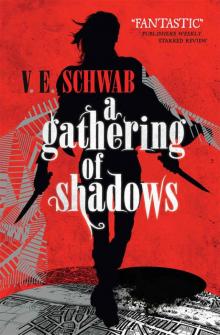 A Gathering of Shadows
A Gathering of Shadows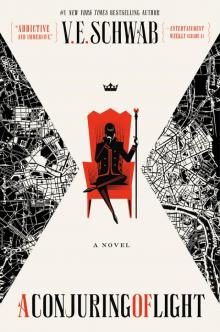 A Conjuring of Light
A Conjuring of Light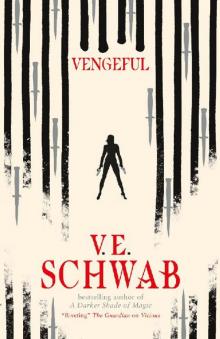 Vengeful
Vengeful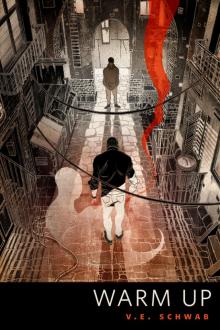 Warm Up
Warm Up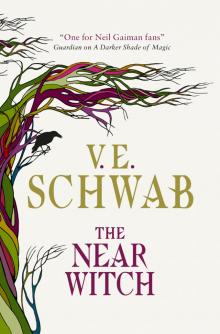 The Near Witch
The Near Witch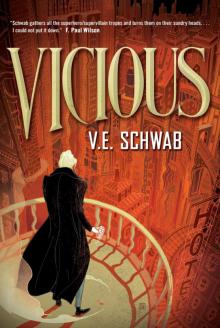 Vicious
Vicious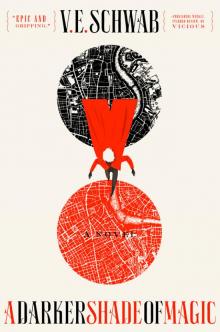 A Darker Shade of Magic
A Darker Shade of Magic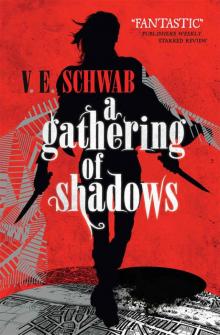 Gathering of Shadows (A Darker Shade of Magic)
Gathering of Shadows (A Darker Shade of Magic)